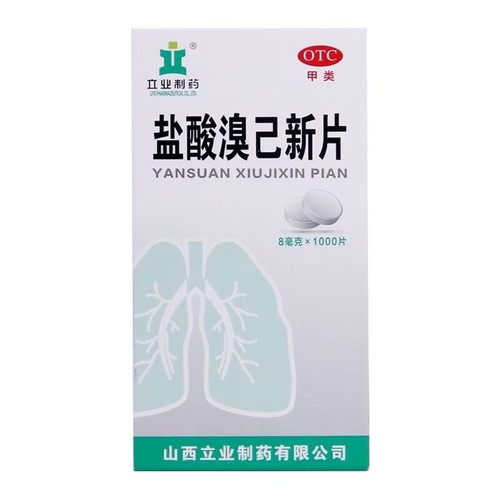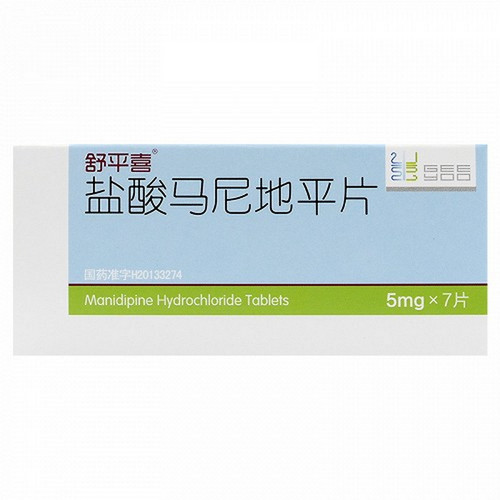Product Overview
[Drug Name]
Generic Name: Benidipine Hydrochloride Tablets
Trade Name: Yuanzhi Benidipine Hydrochloride Tablets, 8mg*7 Tablets
Pinyin Code: YuanZhi YanSuanBeiNiDiPingPian, 8mg*7 Tablets
[Main Ingredient]
The main ingredient of this product is benidipine hydrochloride.
[Properties]
This product is a film-coated tablet. After removing the coating, it appears microscopically yellow-green.
[Indications/Main Functions]
Essential hypertension.
[Specifications]
8mg*7 tablets
[Dosage and Administration]
Oral administration after breakfast. The adult dosage is usually 1-2 tablets (2mg-4mg) once daily. The dosage should be adjusted based on age and symptoms. If the effect is unsatisfactory, the dosage can be increased to 4 tablets (8mg) once daily.Patients with severe hypertension should take 2-4 tablets (4-8mg) once daily.
[Adverse Reactions]
Common adverse reactions are listed below and should be observed carefully. If abnormalities occur, the dosage should be reduced or the drug should be discontinued and appropriate treatment should be taken. 1. Liver: A small number of patients (0.1-5%) experience symptoms of liver function impairment such as increased GOT, GPT, Y-GTP, AI-P, bilirubin, and LDH, so careful observation is required. If abnormalities occur, the drug should be discontinued. 2. Kidney: A small number of patients (0.1-5%) experience increased BUN and creatinine. 3. Blood: A small number of patients (0.1-5%) experience decreased white blood cell count and increased eosinophils. 4. Circulatory system: A small number of patients (0.1-5%) experience palpitations, facial flushing, hot flashes, and decreased blood pressure. A very small number of patients (<0.1%) experience chest heaviness, bradycardia, tachycardia, and some experience extrasystoles. 5. Nervous system: A small number of patients (0.1-5%) experience headaches, heaviness of the head, dizziness, unsteady gait, and orthostatic hypotension. A very small number of patients (<0.1%) experience drowsiness and numbness. 6. Digestive System: A small number of patients (0.1-5%) experience constipation, while a very small number (<0.1%) experience abdominal discomfort, nausea, heartburn, thirst, diarrhea, and vomiting. 7. Allergies: A small number of patients (0.1-5%) experience rash, a very small number (<0.1%) experience itching, and some experience photosensitivity. If rash, itching, or photosensitivity occur, discontinue the drug. 8. Other: A small number of patients (0.1-5%) experience edema (face, calves, hands) and increased GPK. A very small number (<0.1%) experience tinnitus, redness or warmth in the fingers, shoulder stiffness, cough, frequent urination, and fatigue.
[Contraindications]
The following patients should not use this drug: 1. Patients with cardiogenic shock [taking Yuanzhi mg may worsen symptoms] 2. Pregnant women or women who may become pregnant. Contraindicated in breastfeeding women.
[Drug Interactions]
1. Other antihypertensive drugs: Potent antihypertensive effects may cause excessive lowering of blood pressure. 2. Digoxin: Inhibits digoxin secretion in the renal tubules, increasing the digoxin concentration in the blood. This may cause digitalis poisoning. 3. Cimetidine: Cimetidine inhibits the calcium antagonist metabolizing enzyme in liver microsomes, while reducing gastric acid and increasing drug absorption. This may cause excessive lowering of blood pressure. 4. Rifampicin: Rifampicin induces drug metabolizing enzymes in the liver, promoting the metabolism of calcium antagonists, which may reduce the blood concentration of benidipine and weaken the antihypertensive effect. 5. Grapefruit juice: Grapefruit juice inhibits the metabolism of this product in the liver, increasing the blood concentration of this product. This may cause excessive lowering of blood pressure.
[Precautions]
1. Use with caution (the following patients should use this drug with caution) (1) Patients with low blood pressure. (2) This product may aggravate liver damage, so use with caution in patients with severe liver damage. (3) For elderly patients, refer to the (medication for elderly patients) section. 2. Important basic precautions (1) There have been reports of worsening symptoms after sudden discontinuation of calcium antagonists. Therefore, when discontinuing this product, the dosage should be gradually reduced and carefully observed. In addition, patients should be advised not to stop the drug on their own. (2) Taking this product may cause excessive lowering of blood pressure and transient loss of consciousness. If such symptoms occur, the drug should be discontinued and appropriate treatment should be given. (3) Sometimes dizziness caused by the antihypertensive effect may occur. Therefore, caution should be exercised when engaging in dangerous mechanical operations such as high-altitude work and driving a car. 3. Other precautions It has been reported that patients undergoing continuous outpatient peritoneal dialysis sometimes have turbid dialysis fluid. Therefore, care should be taken to differentiate it from peritonitis.
[Pharmacology and Toxicology]
This product is a dihydropyridine calcium antagonist that binds to the DHP binding site of the cell membrane potential-dependent calcium channel, inhibiting the influx of calcium ions, thereby dilating the coronary arteries and peripheral blood vessels. In addition, this product is widely distributed in the cell membrane, mainly entering the cell and binding to the DHP binding site. In addition, studies of in vitro vasoconstriction inhibition and affinity for the DHP binding site demonstrated that this product strongly binds to the DHP binding site and dissociates very slowly, resulting in a sustained pharmacological effect independent of blood concentration. 1. Antihypertensive Effect: Oral administration of this product to spontaneously hypertensive rats, DOCA-salt hypertensive rats, and renal hypertensive dogs demonstrated a slow and sustained antihypertensive effect. Long-term administration does not induce drug tolerance. Once-daily oral administration of this product to patients with essential hypertension did not affect intraday blood pressure fluctuations and demonstrated a stable antihypertensive effect over a 24-hour period. 2. Antianginal Effect: This product significantly improved cardiac function and ischemic electrocardiographic changes induced by coronary artery ligation and reperfusion in experimental angina models (rat) and dogs. Oral administration of this product to patients with exertional angina pectoris demonstrated an improvement in ischemic changes (electrocardiographic ST segment depression) induced by exercise stress. 3. Protective Effect on Renal Function: Continuous oral administration of this drug to spontaneously hypertensive rats with renal insufficiency (5/6 nephrectomy) demonstrated a hypotensive effect and improved renal function. Oral administration of this drug to patients with essential hypertension significantly increased renal blood flow. Oral administration of this drug to patients with hypertension and chronic renal insufficiency significantly increased creatinine clearance and urea nitrogen clearance, demonstrating a protective effect on renal function. 4. Inhibition of Vascular Remodeling and Protection of the Vascular Endothelium: This drug increases NO production by activating endothelial NO synthase (eNOS) and enhancing eNOS gene expression. Its antioxidant properties inhibit NO inactivation, ultimately increasing NO bioactivity, thereby inhibiting vascular remodeling and protecting the vascular endothelium.








